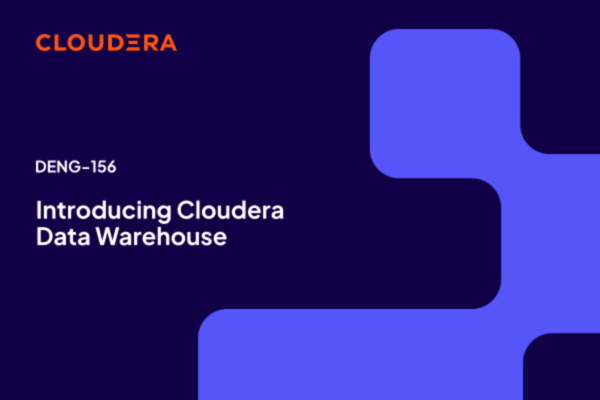
About This Module This module introduces data engineers and data analysts to the Cloudera Data Warehouse service. It introduces basic concepts, and then provides a choice to continue with a Data Engineer track, which shows how to create and tune important entities within Cloudera Data Warehouse, or with a Data Analyst track, which shows how to access tables and views using different interface methods. Module Length This module includes 52 minutes of video content. The videos for the Data Analyst track add to 38 minutes; the videos for the Engineer track add to 33 minutes. Note: In order to complete the hands-on exercises for this course, students must have access to CDW through their organization. Audience and Prerequisites This module is designed for data analysts and data engineers. There are no prerequisites, though access to a working Cloudera with Cloudera Data Warehouse is required in order to complete the hands-on exercises. Grading for This Module There are seven chapters in this module, but you only need to complete four quizzes with 75% or better to pass. (One chapter does not include a quiz.) After the first three chapters, you can choose the two Data Engineer track chapters, or the two Data Analyst track chapters. Your reported grade will include the quizzes for chapters you did not take, but the overall passing level has been lowered to 50%. This means you do not need to take the quizzes for the other track. However, you are welcome to complete all seven modules (and take all six quizzes). Read more

About This Course The Cloudera Operational Database Fundamentals course provides an overview of what an operational database (OpDb) is, the motivation and use cases behind using an OpDb in the enterprise, and how an OpDb fits within the data lifecycle. The course describes the operational database capabilities available in the various form factors, including Cloudera on premises and Cloudera on Cloud, and how to work with an OpDb from the shell, a SQL client, and programmatically in code. Course Length This module includes 1.5 hours of video content. There are no hands-on exercises. Audience and Prerequisites This course is designed for managers, administrators, and developers. We highly recommend that participants be familiar with CDH, HDP, CDP Private Cloud, or CDP Public Cloud to be able to set up an operational database. The Cloudera on Cloud Administration and Cloudera on Premises trainings are good starting points to prepare for this training. Additionally, knowledge of Python is required for using Thrift and knowledge of Java for working with the HBase API. Basic Linux knowledge is required which includes the ability to SSH into a node and starting up a CLI. Knowledge of Apache HBase and Apache Phoenix is not required. Read more

About This Module During this series, Mark Payne, a Principal Software Engineer at Cloudera and co-creator of Apache NiFi, will explain several common ways that people use NiFi incorrectly or inefficiently. After explaining the weaknesses of each approach, Mark then shows how to improve those flows to make better use of NiFi's design and architecture. Part 1: Flows Overview examines a flow that splits and rejoins data, treats structured/semi-structured data as unstructured text, and blurs the line between FlowFile content and attributes. Part 2: Flow Layout illustrates how a disorganized dataflow can make it difficult to understand and maintain. Mark shares tips for laying out the dataflow to make it clean, simple, and easy for others to follow. Part 3: Load Balancing explains how to make your dataflows more scalable by balancing the load across a cluster of nodes. Mark also references his Cloudera technical blog post that shows how NiFi can process more than one billion events per second. Part 4: Scheduling covers scheduling and concurrency anti-patterns. Mark discusses common problems related to thread pools, scheduling processors, and how to configure settings for best performance. Part 5: Primary Node Only looks at the primary node and how it is sometimes misused. Please note: This course does not award a course completion certificate. Module Length This course includes 1 hour of video content. Read more
Shopping Cart
Your cart is empty
